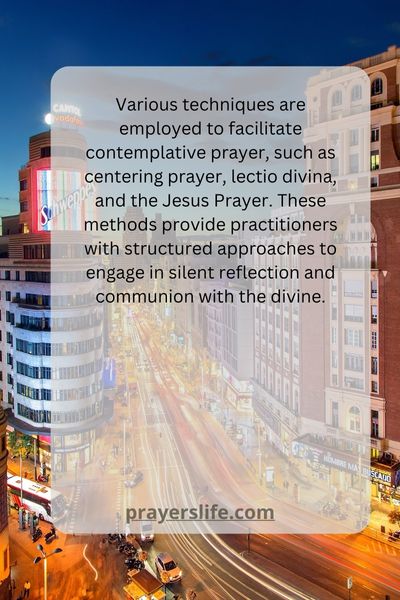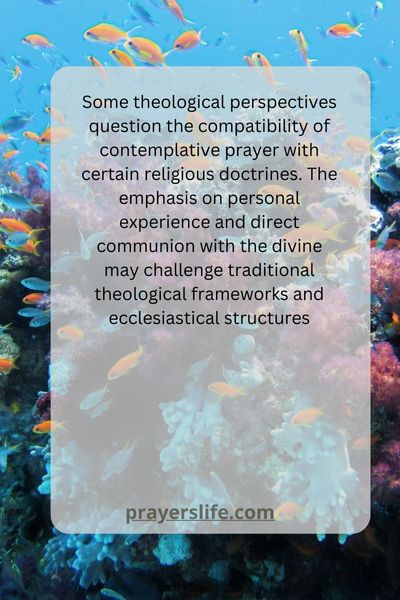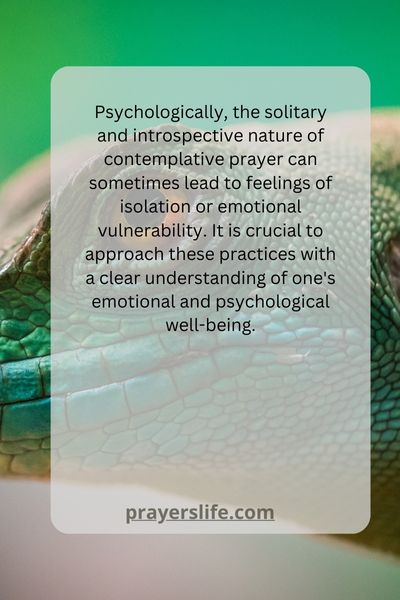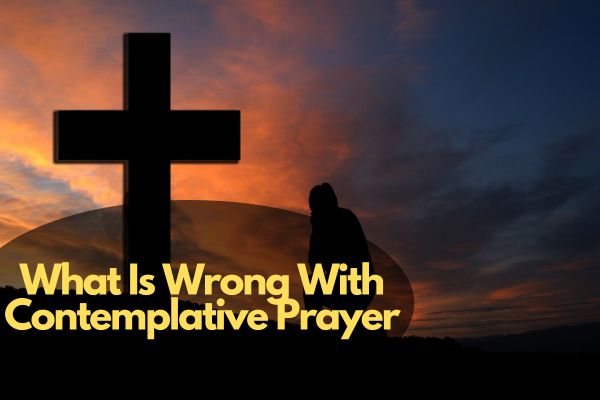Table of Contents Show
Welcome to an exploration of the nuances surrounding the practice of contemplative prayer. In this article, we will look deeply into the various aspects of this spiritual discipline, uncovering both its virtues and potential concerns. With a focus on the question “What is wrong with contemplative prayer,” we aim to provide a comprehensive analysis that encourages a balanced perspective on this ancient spiritual practice.
What Is Wrong With Contemplative Prayer
In today’s fast-paced world, many individuals seek solace and spiritual connection through contemplative practices. Contemplative prayer, a form of silent, meditative prayer, has gained popularity in various religious and spiritual communities. While it is often considered a means to deepen one’s faith and find inner peace, there are growing concerns about its potential drawbacks and implications.
Understanding Contemplative Prayer
Contemplative prayer, also known as mental prayer or christian meditation, is a spiritual practice aimed at fostering a deeper connection with the divine. It involves quieting the mind and embracing silence to facilitate a contemplative encounter with God.

Contemplative Prayer Techniques
Various techniques are employed to facilitate contemplative prayer, such as centering prayer, lectio divina, and the Jesus Prayer. These methods provide practitioners with structured approaches to engage in silent reflection and communion with the divine.

Potential Pitfalls of Contemplative Prayer
While contemplative prayer can offer profound spiritual experiences, it is essential to recognize its potential pitfalls. Excessive detachment from the material world and a tendency towards spiritual escapism can lead to an imbalance in one’s life.

Theological Concerns
Some theological perspectives question the compatibility of contemplative prayer with certain religious doctrines. The emphasis on personal experience and direct communion with the divine may challenge traditional theological frameworks and ecclesiastical structures.

Psychological Implications
Psychologically, the solitary and introspective nature of contemplative prayer can sometimes lead to feelings of isolation or emotional vulnerability. It is crucial to approach these practices with a clear understanding of one’s emotional and psychological well-being.

Misconceptions About Contemplative Prayer
There are common misconceptions surrounding contemplative prayer, often stemming from a lack of awareness or understanding. These misconceptions can lead to misunderstandings about its purpose, practice, and potential impact on spiritual growth.
Evaluating Contemplative Prayer Practices
Evaluating the efficacy of contemplative prayer practices requires a nuanced understanding of their spiritual and psychological implications. Assessing the benefits and drawbacks of these practices can aid in discerning their role in personal spiritual development.
Balancing Contemplation and Action
Balancing contemplative practices with active engagement in the world is crucial for maintaining a holistic spiritual life. Cultivating a sense of mindfulness and purposeful action can enhance the transformative power of contemplative prayer.
Maintaining Spiritual Discernment
Maintaining spiritual discernment is essential when engaging in contemplative prayer. Developing a discerning attitude enables individuals to navigate the complexities of spiritual experiences and distinguish between authentic encounters and deceptive illusions.
Historical Context of Contemplative Prayer
Understanding the historical context of contemplative prayer is essential for comprehending its evolution and enduring significance within various religious traditions. Exploring the origins and development of this practice can shed light on its contemporary relevance.
Contemporary Interpretations and Debates
Contemplative prayer continues to undergo reinterpretation and reevaluation in the context of contemporary spirituality. Engaging with ongoing debates and diverse interpretations allows for a deeper appreciation of its multifaceted nature.
Critiques from Different Religious Perspectives
Contemplative prayer has garnered both praise and critique from different religious perspectives. Understanding these varied viewpoints provides a comprehensive understanding of its impact on diverse spiritual communities.
Ethical Considerations
Ethical considerations related to contemplative prayer revolve around issues of authenticity, integrity, and moral responsibility. Reflecting on the ethical dimensions of these practices ensures their alignment with personal values and ethical standards.
Personal Experiences and Testimonials
Personal experiences and testimonials offer valuable insights into the transformative power of contemplative prayer. Exploring the narratives of individuals who have engaged in these practices can illuminate the profound impact of contemplative prayer on their spiritual journeys.
Secular Critiques of Contemplative Practices
Secular critiques of contemplative practices emphasize the need for a balanced approach to spiritual growth and development. Acknowledging these critiques encourages a holistic understanding of the potential benefits and limitations of contemplative prayer.
Mental Health Implications
Assessing the mental health implications of contemplative prayer underscores the importance of integrating spiritual practices with psychological well-being. Promoting a holistic approach to mental health ensures the responsible and informed practice of contemplative prayer.
Cultivating Healthy Spiritual Practices
Cultivating healthy spiritual practices involves creating a balanced approach to contemplative prayer that nurtures both spiritual and emotional well-being. Integrating self-care and mindfulness enhances the transformative potential of these practices.
Integrating Contemplative Prayer with Modern Life
Integrating contemplative prayer with the demands of modern life requires a strategic and mindful approach. Finding ways to incorporate contemplative practices into daily routines fosters a sustainable and meaningful spiritual life.
Cultural Impact and Relevance
The cultural impact and relevance of contemplative prayer extend beyond religious boundaries, influencing various aspects of art, literature, and philosophy. Recognizing its cultural significance enriches our understanding of its enduring relevance in contemporary society.
Reconciling Faith and Doubt
Reconciling faith and doubt within the context of contemplative prayer involves embracing the uncertainties of spiritual experiences while nurturing a resilient and authentic faith. Engaging with doubt can lead to a deeper and more profound spiritual understanding.
Risk of Spiritual Confusion
Without proper guidance and understanding, individuals practicing contemplative prayer may encounter spiritual confusion. The absence of a structured approach can leave practitioners vulnerable to misleading interpretations and conflicting spiritual experiences.
Finding Balance in Spiritual Growth
Finding balance in spiritual growth entails recognizing the dynamic interplay between contemplative practices and active spiritual engagement. Cultivating a balanced approach fosters a holistic and integrated spiritual life.
Building a Supportive Community
Building a supportive community is integral to nurturing a flourishing spiritual life centered around contemplative practices. Engaging with like-minded individuals fosters a sense of belonging and encourages mutual support and spiritual growth.
Navigating Skepticism and Misunderstanding
In a world filled with skepticism and misconceptions about spiritual practices, it is important to approach contemplative prayer with an open mind and a willingness to understand its essence beyond preconceived notions. By fostering an environment of mutual respect and understanding, individuals can navigate the challenges posed by skeptics and promote a deeper understanding of the practice.
Nurturing a Holistic Spiritual Life
Nurturing a holistic spiritual life encompasses the integration of contemplative practices with ethical living, meaningful relationships, and a sense of purpose. Fostering holistic spiritual growth enables individuals to lead authentic and purposeful lives.
Conclusion
In conclusion, the practice of contemplative prayer, while rich in spiritual significance, demands a nuanced approach that embraces its virtues while acknowledging its potential pitfalls. By cultivating a balanced and discerning attitude, individuals can harness the transformative power of contemplative prayer to foster a deeper connection with the divine and enrich their spiritual lives.
FAQs
1. Can anyone practice contemplative prayer?
Yes, contemplative prayer is open to anyone seeking a deeper spiritual connection, regardless of their religious affiliation.
2. What should one do if they experience confusion during contemplative prayer?
Seeking guidance from a knowledgeable spiritual mentor or counselor can help address any confusion or challenges during the practice.
3. How does contemplative prayer differ from meditation?
Contemplative prayer often emphasizes a deeper spiritual connection with the divine, whereas meditation can focus on various secular or spiritual goals beyond a specific religious context.








